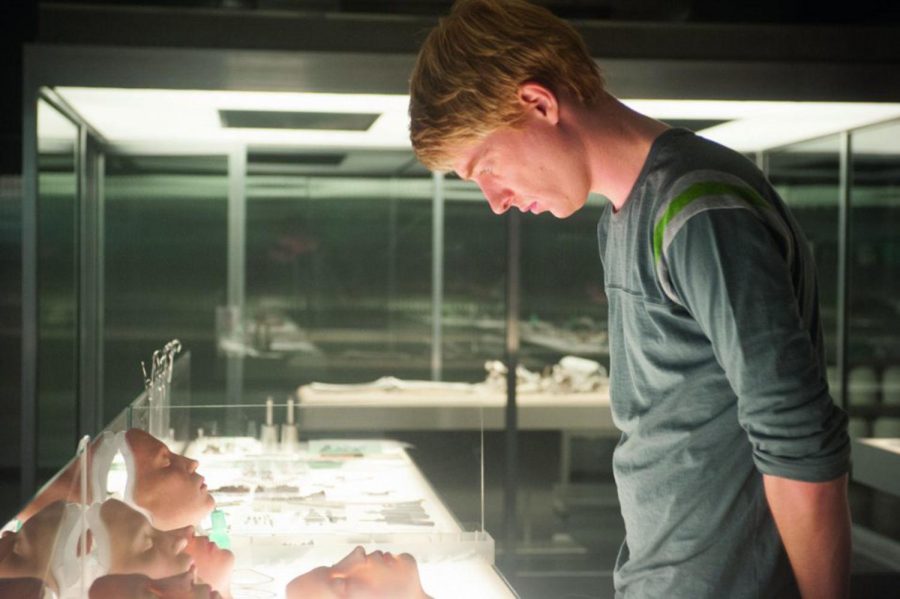Garland goes back to the future with ‘Ex Machina’
April 15, 2015
‘Ex Machina’
Directed by: Alex Garland
Starring: Domhnall Gleeson, Oscar Isaac, Alicia Vikander
Grade: B+
Looking past smartphones and Google Glass to the next level of digital advancement, Alex Garland’s “Ex Machina” brings artificial intelligence uncomfortably close in the form of a flirting humanoid-cyborg.
Garland, the writer behind horror/thriller blockbusters “28 Days Later…,” “Dredd” and “Sunshine,” makes his directoral debut with “Ex Machina.”The sci-fi thriller follows the same cinematic recipe of graphic visual effects and bleak depictions of the future.
The film starts out with Caleb (Domhnall Gleeson), an unassuming programmer for a Google-esque company. Caleb wins an office lottery to spend a week with the company’s CEO, Nathan (Oscar Isaac), in his remote estate and research facility. There, Nathan reveals that Caleb will deliver an in-house Turing Test, an experiment that measures a machine’s ability to exhibit intelligent human behavior. The test subject is Ava (Alicia Vikander), Nathan’s latest humanoid-cyborg prototype.
But what appears to be the opportunity of a lifetime slowly dissolves into conflict and suspicion. Nathan’s alcoholism and cavalier attitude escalate to episodes of abuse toward his assistant/lover, Kyoko (Sonoya Mizuno), and others. While Ava’s increasingly human flirtation and emotional manipulation give Caleb cause to question their motives.
Much less poetic than “A.I. Artificial Intelligence,” certainly smarter than “I, Robot” and hardly as romantic as “Her,” “Ex Machina” seems aware of the familiar ground it treads, but is satisfied to treat its subject as if it’s never been done — the film is cold, calculated and stylishly minimalist, approaching the potentially ridiculous with deadpan seriousness.
Though “Ex Machina” possesses a general simplicity — one real location, three essential characters — Garland’s crafty writing and elegant direction elevate its well-worn premise into intellectually engaging sci-fi. The film discusses big ideas without talking down to the audience, and the plot is refreshingly unpredictable.
“Ex Machina” also benefits from its actors’ performances. Vikander is exceptional as the android. Her scrupulous acting — as well as seamless visual effects — enhance the film’s believability.
Isaac brings his typical dramatic chops to a silly character — his portrayal of a genius drunk who prefers guy-talk to heady science jargon works better than one might expect. Gleeson is easily the cast’s weakest link because of his stiff American accent and plain personality, but he plays the role of the everyman well.
The film’s chilly cinematography and electronic score establish a gripping atmosphere to an otherwise meditative experience. Garland builds tension so naturally that there is no need for off-the-wall third act craziness, like the trite explosions found in other sci-fi flicks, to sustain the audience’s attention. The film resists cheap gimmicks and false thrills, making the quiet climax tangibly exciting.
“Ex Machina” banks its significance on the earnestness of expressing its ideas by tossing around questions and ruminations on consciousness and the God-complex of manufacturing it. The film’s highlight moments are often found in the near-comic banter between Caleb and Nathan — the programmer with plenty of knowledge and genuine interest, and the CEO with much greater knowledge and far less concern for it. Garland’s dialogue makes abstract topics conversational and extracts all the mind-bending delights from his own concoction of hard science fiction. The film’s indie modesty and mainstream high-concept appeal may take it to sci-fi cult classic status, or at least make it an underground hit.
For all of the film’s successes, its most valuable asset may be its aura of coolness. With the intelligent script and quiet but clever effects, “Ex Machina” makes science sexy without breaking a sweat.








